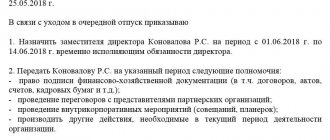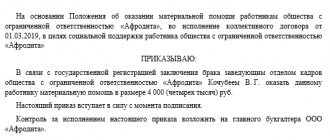Why an organization may need financial assistance and how to provide it
The founder of the organization can help her financially by transferring his own funds to her current account.
Since 2021, the procedure for providing free assistance to the organization by its participants has not changed. Transferring funds to a company account may be required for various reasons:
- to repay the organization's debt on its obligations;
- acquisition of necessary property;
- expansion of activities, etc.
You can make a transfer in several ways:
- by making a contribution to the authorized capital of the LLC, in accordance with the requirements of Article 19 of the Federal Law “On Companies...” dated 02/08/1998 No. 14-FZ;
- by transferring funds as a gift (gratuitous assistance), without changing the size of the participants’ shares, for example, by virtue of Article 572 of the Civil Code of the Russian Federation;
- through the provision of temporary repayable assistance (loan) in accordance with Article 807 of the Civil Code of the Russian Federation.
When choosing one of the above methods, it is recommended to pay attention to 2 points:
- The complexity and length of the paperwork process.
- The possibility of exempting an organization from paying tax on funds contributed by a participant, which is often a determining factor when carrying out such operations.
How to get a loan to the founder from an LLC
You may not indicate in the contract documents the period for which the loan was issued. This is not mandatory, but the law states that the debtor is obliged to pay the creditor within 30 days from the moment he requested it. It is better when the repayment schedule for borrowed funds is clearly stated. The possibility of obtaining a loan from your own company does not contradict current legislation. Any individuals and legal entities can enter into such an agreement on the terms that suit both parties. Registration takes place in any written form - there is no strict format for the loan document.
21 Dec 2021 marketur 208
Share this post
- Related Posts
- Preferential euro exchange rate in St. Petersburg
- Collective agreement surgutneftegaz preferential travel
- Krasnodar region land tax benefit
- VAT benefit for housing and communal services
Financial assistance through a contribution to the authorized capital
When contributing funds to the authorized capital, you should remember that, by virtue of subparagraph 3 of paragraph 1 of Article 251 of the Tax Code of the Russian Federation, the organization should not include the funds received in this way into the taxable base. Both an existing participant (citizen or organization) and a person intending to become a participant in this company by virtue of the provisions of paragraph 2 of Article 19 of Federal Law No. 14 can deposit money in this way.
The procedure for making a contribution is as follows:
- A participant (or a third party) must submit an application for making an additional contribution to the authorized capital (or accepting him as a member of the organization), which should indicate:
- size and composition of the deposit;
- the procedure and deadline for its submission;
- the size of the share that the participant or third party plans to acquire during this transaction.
- Other participants of the company at their meeting must approve the application with their decision to increase the authorized capital, and also decide to amend the company’s charter in connection with a change in the percentage of shares of other participants.
After the company makes the above decisions, the participant must pay in full the amount indicated in the application within 6 months. After making a share, by virtue of clause 2.1 of Article 19 of Federal Law No. 14, the director of the company is obliged, within 1 month, to submit an application to the body maintaining the Unified State Register of Legal Entities to make changes to the register, as well as documents confirming the fact of full payment of the share by the participant. The procedure for making a contribution will be considered completed after state registration of changes made to the charter.
Free financial assistance from the founder through a gift agreement
Free financial assistance from the founder in 2021 can also be formalized by a gift agreement (providing so-called financial assistance). However, this option, despite the need to prepare only one document, has its limitations.
In particular, due to the provisions of paragraph 1 of Article 575 of the Civil Code of the Russian Federation, it is unacceptable if the founder of a commercial organization is another commercial company, since gift transactions between commercial organizations are prohibited, with the exception of gifts worth up to 3,000 rubles.
Another disadvantage of this method is the need to take into account the size of the share of a particular founder in the LLC. Thus, by virtue of subparagraph 11 of paragraph 1 of Article 251 of the Tax Code of the Russian Federation, if the share of this founder exceeds 50% of the total authorized capital of the organization, the funds transferred as gratuitous assistance are not subject to income tax.
In addition, it is important to remember that this rule regarding things (this restriction does not apply to money) also applies when the property transferred by the founder is not transferred to other persons within 1 year. Such a “privilege” of the founder, by virtue of the provisions of subparagraph 1 of paragraph 1.1 of Article 346.15 of the Tax Code of the Russian Federation, also applies to organizations with a simplified tax system that do not pay income tax in the general manner.
If the founder providing assistance does not own shares in the amount of more than half of the total authorized capital, the transferred funds, by virtue of the provisions of paragraph 8 of part 1 of Article 250 of the Tax Code of the Russian Federation, will fall under non-operating income and, therefore, will be included in the taxable base.
The assistance must be transferred free of charge, that is, without any reciprocal obligations on the part of the organization. Also, the help must be irrevocable.
Mandatory (material) terms of the transaction are:
Subscribe to our newsletter
Yandex.Zen VKontakte Telegram
- the subject of the contract (that is, an exact indication of the amount transferred or other things);
- gratuitous donation.
Interest-free loan from a non-founder director
Rationale: The LLC owns separate property, which is accounted for on its independent balance sheet, and can, in its own name, acquire and exercise property and personal non-property rights, bear responsibilities, and be a plaintiff and defendant in court. An LLC may have civil rights and bear civil obligations necessary to carry out any types of activities not prohibited by federal laws, if this does not contradict the subject and goals of the activity, as determined by the limited charter of the company (“Clause 2 of Article 2” of Law No. 14-FZ) . By virtue of “p. 1 tbsp. 40" of Law No. 14-FZ, the general director is the sole executive body of the limited liability company. The general director is authorized to act without a power of attorney on behalf of the company, including making transactions (“clause 1, clause 3, article 40” of Law No. 14-FZ). Citizens (individuals) and legal entities acquire and exercise their civil rights of their own will and in their own interest. They are free to establish their rights and obligations on the basis of the contract and to determine any terms of the contract that do not contradict the law (“Clause 2 of Article 1” of the Civil Code of the Russian Federation). According to “Art. 421" of the Civil Code of the Russian Federation, citizens and legal entities are free to enter into an agreement. At the same time, transactions (including loan, lease, purchase and sale agreements) in which there is an interest of the person performing the functions of the sole executive body of the company (general director), are carried out by the company with the approval of the general meeting of the company's participants, except in cases if the terms of such a transaction do not differ significantly from the terms of similar transactions concluded between the company and an interested party in the course of ordinary business activities of the company. The specified persons (general director) are recognized as interested in the company’s transaction, including in cases where they are a party to the transaction (“Article 45” of Law No. 14-FZ). Thus, an LLC has the right to enter into agreements with the general director of the same company, subject to the approval of these transactions by the general meeting of LLC participants. Failure to comply with this procedure may serve as grounds for declaring the transaction invalid (“Clause 4” of Resolution of the Plenum of the Supreme Arbitration Court of the Russian Federation dated June 20, 2007 N 40 “On some issues of practice in applying the provisions of the legislation on interested-party transactions”). It should be noted that approval is not required in an LLC with one participant (“Clause 6, Article 45” of Law No. 14-FZ). As for signing a loan agreement by the general director on both sides (with himself), you need to be guided by the following. Based on “p. 3 tbsp. 182" of the Civil Code of the Russian Federation, a representative cannot make transactions on behalf of the represented person in relation to himself personally. At the same time, according to “p. 1 tbsp. 53" of the Civil Code of the Russian Federation, a legal entity acquires civil rights and assumes civil responsibilities through its bodies acting in accordance with the law, other legal acts and constituent documents. Thus, the bodies of a legal entity, including the general director, cannot be considered as independent subjects of civil legal relations and, therefore, act as representatives of a legal entity in civil legal relations. It follows from this that the actions of the general director of the company must be regarded as the actions of the company itself, and not of its representative. It also follows that the same individual can conclude a transaction and sign a document containing it, acting on both sides of the transaction as bodies of various legal entities or on his own behalf (see, for example, the Resolution of the Presidium of the Supreme Arbitration Court of the Russian Federation dated April 11, 2006 “ N 10327/05", FAS Far Eastern District dated 04.08.2008 "N F03-A59/08-1/2107" in case N A59-393/05-C6). Thus, an individual has the right to enter into agreements with a limited liability company in which he is the general director, subject to the rule on approval of interested party transactions. Question: Does an LLC have the right to enter into agreements (loan, lease, purchase and sale) with the general director of the same company? Who should sign these agreements on the part of the company? If they are signed by the general director himself on both sides (with himself), wouldn’t this be a violation of the law?
Please note => 2021 the municipality pays for kindergarten security
Temporary financial assistance through a loan agreement
In addition to contributing funds to the authorized capital of the company on a gratuitous basis (non-repayable assistance), the founder can transfer financial assistance temporarily, with the condition of subsequent repayment. Some people call such an agreement an agreement of temporary financial assistance, but the Civil Code of the Russian Federation does not contain such an agreement.
In this case, an ordinary loan agreement can be used (more details about the loan can be found in the corresponding article), under which, by virtue of Article 807 of the Civil Code of the Russian Federation, the borrower is the organization represented by its director, and the lender is the founder.
A loan agreement, like a gift agreement between a citizen (organization) and another organization, by virtue of Article 161 of the Civil Code of the Russian Federation must be written.
According to Article 807 of the Civil Code of the Russian Federation, there are 2 essential conditions for a loan transaction:
- An exact indication of the amount of money being loaned or a list of other unused items that can be returned in the same quantity.
- Loan repayment.
Due to the requirements of Article 809 of the Civil Code of the Russian Federation, the loan agreement is assumed to be reimbursable, that is, the borrower has an obligation to repay the loan with interest specified in the agreement or calculated at the refinancing rate of the Central Bank of the Russian Federation, unless otherwise specified in the agreement. That is why the parties, if we are talking about gratuitous assistance, must indicate in the agreement that the loan provided by the company is interest-free.
The term under the loan agreement, according to Article 810 of the Civil Code of the Russian Federation, is not a mandatory condition. This means that the loan can be provided for an indefinite period (for example, until the organization’s financial situation improves and it can repay the funds received).
If there is no exact repayment period in the loan agreement, the lender has the right to demand that the transferred money be returned back at any time. In this case, the borrower is obliged, by virtue of paragraph 1 of Article 810, to return the funds received within 1 month from the date of receipt of the relevant notification. However, due to the dispositive nature of the provisions of this paragraph of the article, this period may be extended in the interests of the company.
Interest-free loan from a non-founder director
Meanwhile, the Presidium of the Supreme Arbitration Court of the Russian Federation, in its resolution dated 04/05/2011 in case No. 16324/10, indicated that the absence of an original loan agreement in a situation where the actual transfer of funds to the borrower is proven does not entail recognition of the loan agreement as not concluded. Accordingly, the return of money received under this agreement is mandatory. Thus, the position of the courts regarding the conditions under which a loan agreement should be considered concluded is contradictory. In accordance with this position, the conclusion of a lease agreement between an LLC represented by its director and an individual - the director of the LLC is legal. Based on clause 3 of Art. 182 of the Civil Code of the Russian Federation, a representative cannot make transactions on behalf of the represented person in relation to himself personally. Moreover, according to paragraph 1 of Art. 53 of the Civil Code of the Russian Federation, a legal entity acquires civil rights and assumes civil responsibilities through its bodies acting in accordance with the law, other legal acts and constituent documents.
Please note => How to apply for a social pension for a student due to the loss of









